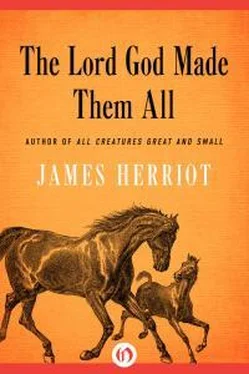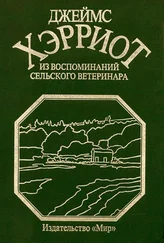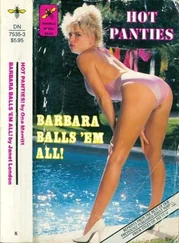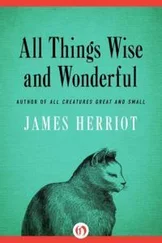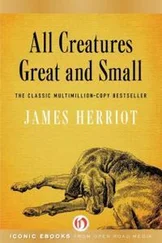Джеймс Хэрриот - The Lord God Made Them All
Здесь есть возможность читать онлайн «Джеймс Хэрриот - The Lord God Made Them All» весь текст электронной книги совершенно бесплатно (целиком полную версию без сокращений). В некоторых случаях можно слушать аудио, скачать через торрент в формате fb2 и присутствует краткое содержание. Год выпуска: 2011, ISBN: 2011, Издательство: Open Road Integrated Media, Жанр: Домашние животные, на английском языке. Описание произведения, (предисловие) а так же отзывы посетителей доступны на портале библиотеки ЛибКат.
- Название:The Lord God Made Them All
- Автор:
- Издательство:Open Road Integrated Media
- Жанр:
- Год:2011
- ISBN:9781453227930
- Рейтинг книги:3 / 5. Голосов: 1
-
Избранное:Добавить в избранное
- Отзывы:
-
Ваша оценка:
- 60
- 1
- 2
- 3
- 4
- 5
The Lord God Made Them All: краткое содержание, описание и аннотация
Предлагаем к чтению аннотацию, описание, краткое содержание или предисловие (зависит от того, что написал сам автор книги «The Lord God Made Them All»). Если вы не нашли необходимую информацию о книге — напишите в комментариях, мы постараемся отыскать её.
The Lord God Made Them All — читать онлайн бесплатно полную книгу (весь текст) целиком
Ниже представлен текст книги, разбитый по страницам. Система сохранения места последней прочитанной страницы, позволяет с удобством читать онлайн бесплатно книгу «The Lord God Made Them All», без необходимости каждый раз заново искать на чём Вы остановились. Поставьте закладку, и сможете в любой момент перейти на страницу, на которой закончили чтение.
Интервал:
Закладка:
Beyond the glass an enormous Oriental was standing. Slit eyes regarded us menacingly from a pock-marked face whose left cheek was hideously scarred from ear to chin, but the most arresting feature was the one-sided mustachio, black and greasy, with its single end dangling several inches from the upper lip. A robe of exotic colouring flowed from the man’s shoulders and his hands, held across his body, were tucked deeply into the sleeves.
The farmer’s wife screamed and jumped from the table, but I sat transfixed. I couldn’t believe this apparition, framed as it was against the buildings and pastures of a Yorkshire farm.
The wife’s rising screams were bordering on hysteria when suddenly she stopped and advanced slowly to the window. As she came close the big man’s mouth relaxed into a friendly leer, then he withdrew a hand from the sleeve and waggled the fingers at her in Oliver Hardy fashion.
“It’s Igor!” she gasped and swung round on her husband. “And that’s me good house coat he’s got on. You rotten devil, you put him up to this!”
The farmer rolled about in his chair, laughing helplessly. He couldn’t have asked for a better response to his little joke.
Igor was one of a batch of prisoners of war who had recently arrived to work on the farm. There were hundreds of these men employed on the land at the end of the war and it was a happy arrangement all round. The farmers had a windfall in the shape of abundant labour, and the prisoners were content to spend their pre-repatriation time in the open air with ample farm meals to sustain them in a world of food rationing. I personally had a respite from one of my constant problems—the lack of help in my job. I found now that there were always willing hands to assist me in the rough-and-tumble of large-animal practice.
The prisoners were, of course, mainly German, but there were a number of Italians and, strangely, Russians. It baffled me at first when I saw hundreds of men who looked like Chinese in German uniforms disembarking at Darrowby railway station. I learned later that they were Mongolian Russians who had been pressed into fighting for the Germans and later were captured by the British. Igor was one of these.
I know of farming families who to this day spend their holidays at the homes of the Germans and Italians whom they befriended at this time.
I was still laughing after the Igor incident and the farmer was still receiving a tongue lashing from his wife when I climbed into my car and consulted the list of calls.
“Preston, Scarth Lodge, lame cow,” I read. It was twenty minutes’ drive away and, as always, I idly turned over the possibilities in my mind. Probably foul, maybe pus in the foot, which would entail some hacking with my hoof knife. Or it could be a strain. I’d soon see.
Hal Preston was bringing my patient in from the field as I arrived, and I didn’t even have to get out of the car to make my diagnosis. It was one which gave me no joy.
The cow was hobbling slowly, her right hind foot barely touching the ground. The limb was shortened and carried underneath the body, while a bulge in the pelvic region showed where the great trochanter of the femur pushed against the skin. Upward displacement. Absolutely typical.
“Just happened this mornin’,” the farmer said. “She was as right as rain last night. Ah can’t think …”
“Say no more, Mr. Preston,” I said. “I know what it is. She’s got a dislocated hip.”
“Is that serious?”
“Yes, it is. You see, it takes tremendous force to pull the head of the displaced bone back into its socket. Even in a dog it is a difficult job, but in cattle it’s sometimes impossible.”
The farmer looked glum. “That’s a beggar. This is a right good cow, smashin’ milker. What ’appens if you can’t get it back?”
“I’m afraid she’d always be a bit of a cripple,” I replied. “Dogs usually form a very good false joint, but it’s different with a cow. In fact, many farmers decide to slaughter the animal.”
“Oh, ’ell, I don’t want that!” Hal Preston rubbed his chin vigorously. “We’ll have to have a go.”
“Good, that’s what I want.” I turned towards my car. “I’m going back to the surgery for the chloroform muzzle, and, in the meantime, will you go round your neighbours and get a few strong chaps? We’ll need all the manpower we can find.”
The farmer looked round the rolling green miles with not another dwelling in sight. “Me neighbours are a long way away, but I don’t need ’em today. Look ’ere.”
He led the way into the farm kitchen where the savoury aroma of roast bacon was heavy in the air. Four burly Germans were seated at the table. In front of each lay a plate mounded high with potatoes, cabbage, bacon and sausage.
“They’ve sent me these fellers to help with haytime,” Mr. Preston explained. “I reckon they look pretty useful.”
“They do indeed.” I smiled at the men and waved my hand in greeting. They jumped to their feet and bowed. “Right,” I said to the farmer, “you can be having your dinners while I’m gone. I’ll be back in about half an hour.”
When I returned, we led the cow to a patch of soft grass. Her progress was painfully slow as she trailed her almost useless hind leg.
I buckled the muzzle to her head and dribbled the chloroform onto the sponge. As she inhaled the strange vapour her eyes widened in surprise, then she stumbled forward and sank to the turf.
I slipped a round stake into the animal’s groin and stationed the two biggest men at either end of it, then I fastened a rope above the fetlock and gave the other end to Mr. Preston and the remaining two Germans.
The stage was set. I crouched over the pelvis and placed both hands on the bulging head of the femur. Would it stay obstinately still or would I feel it riding up the side of the acetabulum on the way to its proper home?
Anyway, this was the moment, and I took a deep breath. “Pull!” I shouted, and the three men on the rope hauled away, while the brown corded arms on each side of me took the strain on the stake.
No doubt an unedifying spectacle, this tug of war with the sleeping animal in the middle. Not much science in evidence, but country practice is often like that.
However, I had no time for theorising—all my mind was concentrated on that jutting bone under my hands. “Pull!” I yelled again, and fresh grunts of effort came back in reply.
I clenched my teeth. The thing wasn’t moving. I couldn’t believe it could resist the terrific traction, but it was like a rock.
Then, when the feeling of defeat was rising, I felt a stirring beneath my fingers. It all happened in seconds after that—the lifting of the femoral head as I pushed frantically at it and the loud click as it flopped into its socket. We had won.
I waved my arms in delight. “All right, let go!” I crawled to the cow’s head and whipped off the muzzle.
We heaved her onto her chest, and she lay there, blinking and shaking her head as consciousness returned. I could hardly wait for what is one of the most rewarding moments in veterinary practice, and it came when the cow rose to her feet and strolled over the grass without the trace of a limp. The five faces, sweating in the hot sunshine, watched in happy amazement, and though I had seen it all before, I felt the warm flush of triumph that is always new.
I handed cigarettes round the prisoners, and before I left I drew on my scanty store of German.
“Danke schoen!” I said fervently, and I really meant it.
“Bitte! Bitte!” they cried, all smiles. They had enjoyed the whole thing, and I had the feeling that this would be one of the tales they would tell when they returned to their homes.
A few days later, Siegfried and I alighted at Village Farm, Harford. We had come together because we had been told that our patient, a Red Poll bullock, was of an uncooperative disposition, and we thought that a combined operation was indicated.
Читать дальшеИнтервал:
Закладка:
Похожие книги на «The Lord God Made Them All»
Представляем Вашему вниманию похожие книги на «The Lord God Made Them All» списком для выбора. Мы отобрали схожую по названию и смыслу литературу в надежде предоставить читателям больше вариантов отыскать новые, интересные, ещё непрочитанные произведения.
Обсуждение, отзывы о книге «The Lord God Made Them All» и просто собственные мнения читателей. Оставьте ваши комментарии, напишите, что Вы думаете о произведении, его смысле или главных героях. Укажите что конкретно понравилось, а что нет, и почему Вы так считаете.
